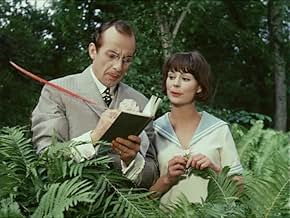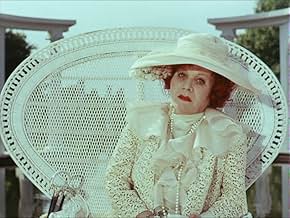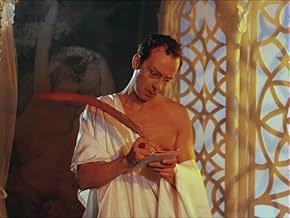PUNTUACIÓN EN IMDb
5,4/10
2,7 mil
TU PUNTUACIÓN
Añade un argumento en tu idiomaA critic blackmails a famous musician with his biography filled with the revelations of many of his women.A critic blackmails a famous musician with his biography filled with the revelations of many of his women.A critic blackmails a famous musician with his biography filled with the revelations of many of his women.
- Dirección
- Guión
- Reparto principal
- Premios
- 1 nominación en total
Jan Blomberg
- English Radio Reporter
- (sin acreditar)
Lars-Owe Carlberg
- Driver
- (sin acreditar)
Axel Düberg
- Man in Black
- (sin acreditar)
Doris Funcke
- Waitress
- (sin acreditar)
Göran Graffman
- French Radio Reporter
- (sin acreditar)
Yvonne Igell
- Waitress
- (sin acreditar)
Ulf Johansson
- Man in Black
- (sin acreditar)
Reseñas destacadas
I never thought that I would have to say that but I did not like the Ingmar Bergman's film "All These Women". In spite the very pretty and delicate pink and blue cinematography and the presence of the charming and talented actresses, the movie was a mess of an attempt to create a comedy. Everything that was subtle, sensual, and charming in B/W "Smiles of a Summer Night" (1955) was missing here. First of all - the Jarl Kulle's performance as a music critic - biographer, Cornelius. Kulle was very effective and funny in "Smiles...", in "Women..." - he plays an irritating, annoying, and the worst - absolutely not funny (which is a crime for a comedy) character. If in "Smiles... the writing was a first class and sparkled, I got the impression that in "Women.." Bergman did not care or did not want to work on the script and was more interested in experimenting with colors and music. The movie looks and sounds fine - it is Bergman, after all, but that's the only redeeming qualities that I found.
4/10
4/10
Comedy without laughs? Certainly. Anyone looking for clever retorts and hilarious situations will be frankly disappointed. Actually, comedy here is nothing more than a style adopted by Bergman for his usual speech. It is the tone that interests him, the tone of farce, of slapstick.
Also Bergman's taste for the theater, for the comedians who appear so many times in his films, for the professionals who repeat the learned and inherited routines, knowing that an actor who knows his job can always make them fun again.
And Bergman when it comes to comedians has the best, not only extraordinary actors but disciplined workers capable of adapting to what the director asks of them at all times. And they indulge in the tired comic routines with absolute conviction and immeasurable talent: above all Jarl Kulle as Cornelius, the critic who goes to visit the master in his summer villa to write the biography of the musician; and of course, the cast of great actresses: Gertrude Frigh (the great theater actress who would be her Hedda Gabler on stage, in addition to appearing in important roles in several of her most famous films), Bibi Andersson (one of the great actresses in Bergman's work), or the wonderful Eva Dahlbeck (even more beautiful than in Smiles) and Harriet Andersson.
The scenes are often amazingly choreographed, with a markedly theatrical nature, and one cannot help but think about the repetitions, the hours of rehearsals necessary for the gear to work with that perfection and that rapport between the actors and the director.
Visually it is a highly sophisticated work, with wonderful color photography by Sven Nykvist and spectacular production design by another regular from the director, P. A. Lundgren, who creates a kind of Hadrian's Villa spiced up with decorations between Rococo and Neo-Gothic, where each room is like a stage of marble and stucco barely occupied by the minimum props required by the scene and white Roman sculptures.
The work is funny, extremely agile, consciously ridiculous, the problem is that Bergman's speech is not as rich as in other works of his (as an advantage it must be said that he does not fall into the pedantry that ruins so many scenes of his work) and no real depth. It is an assumedly minor work, a harmless game about the relationships and mutual dependence of the critic and the artist, about the exposure of the artist in his work and the public's desire to investigate the life and mind of the artist, about the need that artists have for critics who explain them and by studying them places the artists in history. The critic is a vain, selfish, indiscreet, amoral being, but he is at the same time humiliated, used, deceived, ignored. The artist is a mysterious figure, distant, somewhat repulsive from the outside, and elusive, who speaks only through his art.
The direction, as always, is masterful. The work moves away from the gloomy and expressionist style of his previous films (the famous trilogy) and shows that Bergman was looking for new directions, new cinematographic resources. His next films are his two great masterpieces: Persona and The Hour of the Wolf.
Those Women is a far cry from Bergman's great works, but it is by no means the worst of his films. Taking it on its own terms, it's a risky step taken by a director who wanted to present his discourse in a totally new way, with a radically different aesthetic and approach than the one that had so much critical acclaim. The problem is that the movie doesn't tell us too much either. For some it may be the extreme case of the emptiness of content in the background of so many Bergman films, I personally agree that the ultimate value of the director is more often in his expressive abilities in the medium than in the content of his sometimes pedantic and anguished scripts.
Also Bergman's taste for the theater, for the comedians who appear so many times in his films, for the professionals who repeat the learned and inherited routines, knowing that an actor who knows his job can always make them fun again.
And Bergman when it comes to comedians has the best, not only extraordinary actors but disciplined workers capable of adapting to what the director asks of them at all times. And they indulge in the tired comic routines with absolute conviction and immeasurable talent: above all Jarl Kulle as Cornelius, the critic who goes to visit the master in his summer villa to write the biography of the musician; and of course, the cast of great actresses: Gertrude Frigh (the great theater actress who would be her Hedda Gabler on stage, in addition to appearing in important roles in several of her most famous films), Bibi Andersson (one of the great actresses in Bergman's work), or the wonderful Eva Dahlbeck (even more beautiful than in Smiles) and Harriet Andersson.
The scenes are often amazingly choreographed, with a markedly theatrical nature, and one cannot help but think about the repetitions, the hours of rehearsals necessary for the gear to work with that perfection and that rapport between the actors and the director.
Visually it is a highly sophisticated work, with wonderful color photography by Sven Nykvist and spectacular production design by another regular from the director, P. A. Lundgren, who creates a kind of Hadrian's Villa spiced up with decorations between Rococo and Neo-Gothic, where each room is like a stage of marble and stucco barely occupied by the minimum props required by the scene and white Roman sculptures.
The work is funny, extremely agile, consciously ridiculous, the problem is that Bergman's speech is not as rich as in other works of his (as an advantage it must be said that he does not fall into the pedantry that ruins so many scenes of his work) and no real depth. It is an assumedly minor work, a harmless game about the relationships and mutual dependence of the critic and the artist, about the exposure of the artist in his work and the public's desire to investigate the life and mind of the artist, about the need that artists have for critics who explain them and by studying them places the artists in history. The critic is a vain, selfish, indiscreet, amoral being, but he is at the same time humiliated, used, deceived, ignored. The artist is a mysterious figure, distant, somewhat repulsive from the outside, and elusive, who speaks only through his art.
The direction, as always, is masterful. The work moves away from the gloomy and expressionist style of his previous films (the famous trilogy) and shows that Bergman was looking for new directions, new cinematographic resources. His next films are his two great masterpieces: Persona and The Hour of the Wolf.
Those Women is a far cry from Bergman's great works, but it is by no means the worst of his films. Taking it on its own terms, it's a risky step taken by a director who wanted to present his discourse in a totally new way, with a radically different aesthetic and approach than the one that had so much critical acclaim. The problem is that the movie doesn't tell us too much either. For some it may be the extreme case of the emptiness of content in the background of so many Bergman films, I personally agree that the ultimate value of the director is more often in his expressive abilities in the medium than in the content of his sometimes pedantic and anguished scripts.
Boy, I'm so upset right now. Two days ago, you would ask me about the directors who had never disappointed me and the name of Ingmar Bergman would have immediately sprung to mind. But it was before I watched "All These Women".
Two years ago, I wrote a review of "Pierrot le Fou" and I used Bergman's negative statement against Godard as an alibi to my own hostility, if even the director who was the epitome of intellectual and artistic cinema found Godard to be an empty shell, I could rest my case. Yet, "All These Women" makes "Pierrot le Fou" look like "The Seventh Seal" and I couldn't believe the man who used such a bold critic against Godard could indulge to the same farcical tendencies than his rival, but failing as miserably. No matter how good the intentions were.
Finally, many many years ago, I wanted to discover Fellini and started with "8 ½" an unwise choice that made me postpone my exploration of the Italian director's work for one year and a half and made me discover Bergman instead. It's not until I saw the neo-realist films of Fellini that I could appreciate his slow evolution to poetic realism and then surrealism in the 60s. But if the first Bergman movie I saw was that one, I guess I wouldn't be the fan I am today, any film would do for a discovery but "All These Women" is a film that transcends my perception of a bad movie, quite a disturbing experience for someone who built such a high esteem on Bergman. It's not that it's bad, I just don't get how he could make something that bad.
Obviously, the film is meant to be a farce. The little inter-titles carry a certain edge and even mention the censorship that still prevailed, Bergman dodges them with fun artistic licenses, it's funny though because one of the reasons I wanted to watch a Bergman film is that I had just enjoyed the film "Tom Jones" and I've had enough laughs, I wanted to forget about its zany tone and its slight overuse of comical tricks, I wouldn't have thought that Bergman, of all the directors, would have kept me on the same scenery. Somewhat I was amused and even thrilled during the first five minutes, yes, I was determined to enjoy the film.
"All These Women" opens with the funeral of a famous cellist and seven of his women, mistresses and concubines come to pay their respect, each one delivering the same line with a tone that reveals something of her personality, but the camera is so far and the tone so detached that I'm not sure they wanted to know who is who or even that we're supposed to care. Three women would have been enough but seven?! I was glad I could spot the two Andersson, Harriett and Bibi, who had just left us... but I couldn't care much for the others.
It's even more incongruous since the main character is a critic named Cornelius, and not the cellist himself. Cornelius hovers from one room to another, each sequence being the sorry excuse for a gag that supposedly imitates the type of silent comedy used in Benny Hill sketches: jazzy music, fast-paced chases and all, but none of them really work. The first visual essay is the scene involving Cornelius's struggle with a statue and no mater how hard he tired, it didn't get one single laugh from me.
And I guess it's pretty normal since I never expected Bergman to make me laugh, it's one thing to imitate Fellini, but the film doesn't come close to anything the Maestro had done before. Maybe after a streak of existential movies questioning God, Bergman felt the use to loosen up a bit and he's quite entitled to operate a change of tone and style, no matter how disconcerting it can be to the fans, but the result is so disapprovingly disjointed and bizarre. At the end, the film is aesthetically interesting, I suspect it inspired François Ozon's "8 Women" but in the Bergmanian canon, the best thing you can ay about it is that it's an oddity, a curiosity.
There are certainly areas where we're tempted to dig a little and find some statements about the relationships between art and criticism, or the necessity of separating the art from the artist by showing both sides of the same man, from different perspective but his. Maybe the film is deeper than it seems to be or maybe Bergman, like a deliberate hack, wanted to challenge critics' opinions and created this cinematic "trap for idiots". Maybe we'd be stupid to miss the point or to praise it... Maybe.
Still, Bergman is such a heavy director, so intellectually challenging that many of his movies demand several watching to be examined and appreciated, that I'm not sure this one is worth the time even if it's a masterpiece in disguise. I guess it takes a Bergman fan to be able to reach that film and the same Bergmanian fan to be wise enough to forget it.
Yes, sometimes, it's not about separating the Art from an artist, but at least some pieces of it...
Two years ago, I wrote a review of "Pierrot le Fou" and I used Bergman's negative statement against Godard as an alibi to my own hostility, if even the director who was the epitome of intellectual and artistic cinema found Godard to be an empty shell, I could rest my case. Yet, "All These Women" makes "Pierrot le Fou" look like "The Seventh Seal" and I couldn't believe the man who used such a bold critic against Godard could indulge to the same farcical tendencies than his rival, but failing as miserably. No matter how good the intentions were.
Finally, many many years ago, I wanted to discover Fellini and started with "8 ½" an unwise choice that made me postpone my exploration of the Italian director's work for one year and a half and made me discover Bergman instead. It's not until I saw the neo-realist films of Fellini that I could appreciate his slow evolution to poetic realism and then surrealism in the 60s. But if the first Bergman movie I saw was that one, I guess I wouldn't be the fan I am today, any film would do for a discovery but "All These Women" is a film that transcends my perception of a bad movie, quite a disturbing experience for someone who built such a high esteem on Bergman. It's not that it's bad, I just don't get how he could make something that bad.
Obviously, the film is meant to be a farce. The little inter-titles carry a certain edge and even mention the censorship that still prevailed, Bergman dodges them with fun artistic licenses, it's funny though because one of the reasons I wanted to watch a Bergman film is that I had just enjoyed the film "Tom Jones" and I've had enough laughs, I wanted to forget about its zany tone and its slight overuse of comical tricks, I wouldn't have thought that Bergman, of all the directors, would have kept me on the same scenery. Somewhat I was amused and even thrilled during the first five minutes, yes, I was determined to enjoy the film.
"All These Women" opens with the funeral of a famous cellist and seven of his women, mistresses and concubines come to pay their respect, each one delivering the same line with a tone that reveals something of her personality, but the camera is so far and the tone so detached that I'm not sure they wanted to know who is who or even that we're supposed to care. Three women would have been enough but seven?! I was glad I could spot the two Andersson, Harriett and Bibi, who had just left us... but I couldn't care much for the others.
It's even more incongruous since the main character is a critic named Cornelius, and not the cellist himself. Cornelius hovers from one room to another, each sequence being the sorry excuse for a gag that supposedly imitates the type of silent comedy used in Benny Hill sketches: jazzy music, fast-paced chases and all, but none of them really work. The first visual essay is the scene involving Cornelius's struggle with a statue and no mater how hard he tired, it didn't get one single laugh from me.
And I guess it's pretty normal since I never expected Bergman to make me laugh, it's one thing to imitate Fellini, but the film doesn't come close to anything the Maestro had done before. Maybe after a streak of existential movies questioning God, Bergman felt the use to loosen up a bit and he's quite entitled to operate a change of tone and style, no matter how disconcerting it can be to the fans, but the result is so disapprovingly disjointed and bizarre. At the end, the film is aesthetically interesting, I suspect it inspired François Ozon's "8 Women" but in the Bergmanian canon, the best thing you can ay about it is that it's an oddity, a curiosity.
There are certainly areas where we're tempted to dig a little and find some statements about the relationships between art and criticism, or the necessity of separating the art from the artist by showing both sides of the same man, from different perspective but his. Maybe the film is deeper than it seems to be or maybe Bergman, like a deliberate hack, wanted to challenge critics' opinions and created this cinematic "trap for idiots". Maybe we'd be stupid to miss the point or to praise it... Maybe.
Still, Bergman is such a heavy director, so intellectually challenging that many of his movies demand several watching to be examined and appreciated, that I'm not sure this one is worth the time even if it's a masterpiece in disguise. I guess it takes a Bergman fan to be able to reach that film and the same Bergmanian fan to be wise enough to forget it.
Yes, sometimes, it's not about separating the Art from an artist, but at least some pieces of it...
Ingmar Bergman cuts loose with this atypical homage to bedroom farce and (sometimes silent) slapstick comedy, a lark for one of the most serious filmmakers around the globe. There are fun moments, especially when Bergman breaks the fouth wall and winks at the audience ("these fireworks are not meant to be symbolic"!), but overall the film is stilted, static, and rather tiresome. The women are dazzling, but mostly wasted; despite the title, the central character is a man, and he occupies something like 90% of the running time. ** out of 4.
I do say this with a heavy heart as I love and admire Ingmar Bergman and many of his films and thought I'd never see a film of his I didn't like. Until now. By all means it has its good points, the cinematography, settings and music are beautiful and the female cast(with three of Sweden's finest ever actresses) look splendid and really try their best. Unfortunately, Jarl Kulle does nothing to make his annoying character remotely likable. Cornelius isn't the only bad character here though, I didn't care for any of them and none are interesting, for a Bergman film that is unusual. Bergman I love as a director, but he too seems out of his depth with a lack of momentum. The writing seems forced and unfunny, while the story tries to do much but does so in a clumsy and stilted manner.
Overall, I really wanted to love All These Women considering the talent involved, but I found it a really disappointing miscalculation.
4/10 Bethany Cox
Overall, I really wanted to love All These Women considering the talent involved, but I found it a really disappointing miscalculation.
4/10 Bethany Cox
¿Sabías que...?
- CuriosidadesThis is Ingmar Bergman's first color film.
- Créditos adicionalesThe disclaimer at the beginning states that: "Every similarity between this film and the so-called reality has to be a misunderstanding".
- Banda sonoraOrchestral Suite No. 3 D-dur (BWV 1068)
Composed by Johann Sebastian Bach
Selecciones populares
Inicia sesión para calificar y añadir a tu lista para recibir recomendaciones personalizadas
- How long is All These Women?Con tecnología de Alexa
Detalles
- Duración
- 1h 20min(80 min)
- Mezcla de sonido
- Relación de aspecto
- 1.37 : 1
Contribuir a esta página
Sugerir un cambio o añadir el contenido que falta
































